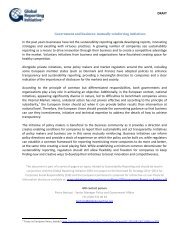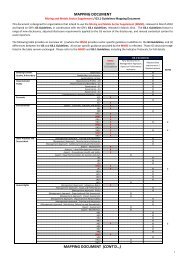Electric Utilities Sector Supplement - Global Reporting Initiative
Electric Utilities Sector Supplement - Global Reporting Initiative
Electric Utilities Sector Supplement - Global Reporting Initiative
Create successful ePaper yourself
Turn your PDF publications into a flip-book with our unique Google optimized e-Paper software.
EC9 Understanding and describing<br />
significant indirect economic impacts,<br />
including the extent of impacts.<br />
1. Relevance<br />
Indirect economic impacts are an important part of<br />
an organization’s economic influence in the context of<br />
sustainable development. Whereas direct economic impacts<br />
and market influence tend to focus on the immediate<br />
consequences of monetary flows to stakeholders, indirect<br />
economic impacts include the additional impacts generated<br />
as money circulates through the economy.<br />
Direct economic impacts are often measured as the value<br />
of transactions between the reporting organization and<br />
its stakeholders, while indirect economic impacts are the<br />
results - sometimes non-monetary - of the transaction.<br />
Indirect impacts are an important aspect of an organization’s<br />
role as a participant or agent in socio-economic change,<br />
particularly in developing economies. Indirect impacts are<br />
particularly important to assess and report in relation to<br />
local communities and regional economies.<br />
For management purposes, indirect economic impacts<br />
are an important indication of where risks to reputation<br />
may develop, or where opportunities may emerge to<br />
expand market access or a social license to operate.<br />
2. Compilation<br />
2.1 Explain work undertaken to understand the<br />
indirect economic impacts the organization has at<br />
the national, regional, or local level.<br />
2.2 Report examples of indirect economic impacts,<br />
both positive and negative, such as:<br />
• Changing the productivity of organizations,<br />
sectors, or the whole economy (e.g., through<br />
greater adoption or distribution of information<br />
technology);<br />
• Economic development in areas of high<br />
poverty (e.g., number of dependents<br />
supported through income from one job);<br />
• Economic impact of improving or deteriorating<br />
social or environmental conditions (e.g.,<br />
changing job market in an area converted from<br />
small family farms to large plantations or the<br />
economic impacts of pollution);<br />
• Availability of products and services for those<br />
on low incomes (e.g., preferential pricing of<br />
Indicator Protocols Set: EC<br />
pharmaceuticals contributes to a healthier<br />
population that can participate more fully in<br />
the economy; pricing structures that exceed the<br />
economic capacity of those on low incomes);<br />
• Enhancing skills and knowledge amongst a<br />
professional community or in a geographical<br />
region (e.g., need for a supplier base creates<br />
a magnet for companies with skilled workers,<br />
which in turn engenders new learning institutes);<br />
• Jobs supported in the supply chain or distribution<br />
chain (e.g., assessing the impacts of growth or<br />
contraction of the organization on its suppliers)<br />
• Stimulating, enabling, or limiting foreign direct<br />
investment (e.g., expansion or closure of an infrastructure<br />
service in a developing country can lead<br />
to increased or reduced foreign direct investment);<br />
• Economic impact of change in location of<br />
operations or activities (e.g., outsourcing of<br />
jobs to an overseas location); and<br />
• Economic impact of the use of products and<br />
services (e.g., linkage between economic<br />
growth patterns and use of particular products<br />
and services).<br />
2.3 Report the significance of the impacts in the<br />
context of external benchmarks and stakeholder<br />
priorities, such as national and international<br />
standards, protocols, and policy agendas<br />
3. Definitions<br />
Indirect economic impact<br />
An additional consequence of the direct impact of<br />
financial transactions and the flow of money between an<br />
organization and its stakeholders.<br />
Economic impact<br />
A change in the productive potential of the economy that<br />
can have an influence on a community’s or stakeholder’s<br />
well-being and longer-term prospects for development.<br />
4. Documentation<br />
None.<br />
5. References<br />
None.<br />
IP<br />
&<br />
EUSS<br />
EU<br />
Version 3.0/EUSS Final Version<br />
17

















